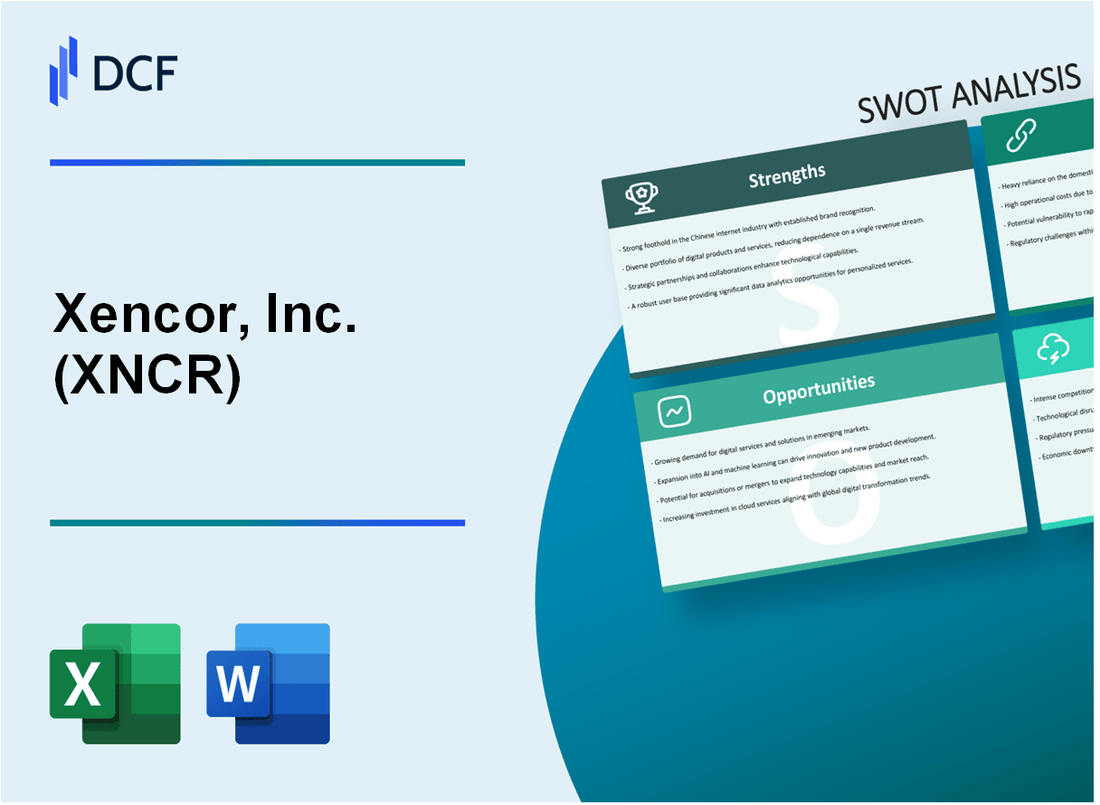
|
Xencor, Inc. (XNCR): SWOT Analysis [Jan-2025 Updated] |

Fully Editable: Tailor To Your Needs In Excel Or Sheets
Professional Design: Trusted, Industry-Standard Templates
Investor-Approved Valuation Models
MAC/PC Compatible, Fully Unlocked
No Expertise Is Needed; Easy To Follow
Xencor, Inc. (XNCR) Bundle
In the dynamic world of biotechnology, Xencor, Inc. (XNCR) stands out as an innovative powerhouse, leveraging its cutting-edge antibody engineering platform to revolutionize therapeutic treatments. With a strategic focus on developing breakthrough immunotherapies across oncology, autoimmune, and infectious disease domains, Xencor has positioned itself as a key player in the precision medicine landscape. This comprehensive SWOT analysis delves deep into the company's competitive strengths, potential vulnerabilities, emerging opportunities, and critical challenges, offering investors and industry observers a nuanced understanding of Xencor's strategic positioning in the rapidly evolving biopharmaceutical ecosystem.
Xencor, Inc. (XNCR) - SWOT Analysis: Strengths
Innovative Bispecific and XmAb Antibody Engineering Platform
Xencor's proprietary XmAb antibody engineering platform has demonstrated significant technological capabilities:
| Platform Metric | Quantitative Data |
|---|---|
| Number of Engineered Antibody Variants | Over 90 unique antibody engineering variants |
| Clinical-Stage Programs | 7 clinical-stage development programs |
| Research & Development Investment | $86.3 million in R&D expenses (2022 fiscal year) |
Strong Intellectual Property Portfolio
Xencor's patent landscape includes:
- Total patent portfolio: 185 issued patents worldwide
- Patent expiration range: 2030-2041
- Geographic patent coverage: United States, Europe, Japan, China
Proven Collaboration Track Record
| Pharmaceutical Partner | Collaboration Value | Year Initiated |
|---|---|---|
| Genentech | $750 million potential milestone payments | 2016 |
| Novartis | $540 million potential milestone payments | 2018 |
| Janssen Pharmaceuticals | $350 million upfront and milestone potential | 2020 |
Diversified Therapeutic Pipeline
Xencor's pipeline distribution across therapeutic areas:
- Oncology: 4 clinical-stage programs
- Autoimmune Diseases: 2 clinical-stage programs
- Infectious Diseases: 1 clinical-stage program
Total Pipeline Value Estimated at: $2.1 billion potential development and commercialization milestones
Xencor, Inc. (XNCR) - SWOT Analysis: Weaknesses
Limited Commercial Product Revenue
Xencor demonstrates significant reliance on research collaborations and milestone payments. Financial data reveals:
| Revenue Source | 2022 Amount | 2023 Amount |
|---|---|---|
| Research Collaboration Revenue | $83.4 million | $97.2 million |
| Milestone Payments | $45.7 million | $52.3 million |
| Total Commercial Product Revenue | $4.2 million | $6.5 million |
Ongoing Net Losses and Cash Burn
The company experiences substantial research and development expenditures:
| Financial Metric | 2022 | 2023 |
|---|---|---|
| Net Loss | $174.6 million | $189.3 million |
| R&D Expenses | $212.8 million | $228.5 million |
| Cash and Investments | $456.7 million | $402.1 million |
Company Size Limitations
Comparative company metrics:
- Total Employees: 324 (as of December 2023)
- Market Capitalization: $1.8 billion
- Annual Revenue: $107.9 million
Clinical Trial Vulnerability
Current developmental program risk assessment:
| Program | Phase | Potential Risk |
|---|---|---|
| XmAb Immune Inhibitor | Phase 2 | High Clinical Uncertainty |
| Cancer Immunotherapy | Phase 1/2 | Moderate Clinical Risk |
Xencor, Inc. (XNCR) - SWOT Analysis: Opportunities
Growing Market Potential in Immunotherapy and Precision Medicine
The global immunotherapy market was valued at $108.3 billion in 2022 and is projected to reach $288.7 billion by 2030, with a CAGR of 12.7%.
| Market Segment | 2022 Value | 2030 Projected Value |
|---|---|---|
| Global Immunotherapy Market | $108.3 billion | $288.7 billion |
Expanding Pipeline of Novel Antibody Therapeutics
Xencor's current pipeline includes multiple therapeutic candidates in various stages of development:
- XmAb®24306 for cancer treatment
- XmAb®819 for multiple myeloma
- XmAb®564 for autoimmune diseases
Potential for Strategic Partnerships and Licensing Agreements
| Partner | Agreement Type | Potential Value |
|---|---|---|
| Novartis | Licensing Agreement | Up to $1.2 billion |
| Genentech | Research Collaboration | Up to $750 million |
Increasing Interest in Targeted Cancer and Autoimmune Treatments
The targeted therapeutics market is expected to grow to $215.6 billion by 2026, with a CAGR of 7.2%.
- Cancer immunotherapy market: Projected to reach $126.9 billion by 2026
- Autoimmune disease treatment market: Expected to reach $88.7 billion by 2026
Xencor, Inc. (XNCR) - SWOT Analysis: Threats
Intense Competition in Biopharmaceutical Research and Antibody Engineering
The competitive landscape in antibody engineering reveals significant market challenges:
| Competitor | Market Capitalization | Active Therapeutic Programs |
|---|---|---|
| Regeneron Pharmaceuticals | $79.3 billion | 18 therapeutic programs |
| Moderna, Inc. | $29.6 billion | 24 clinical-stage programs |
| Genmab A/S | $16.2 billion | 12 therapeutic antibody programs |
Complex and Lengthy Regulatory Approval Processes
Regulatory challenges present significant threats to Xencor's development pipeline:
- Average FDA approval time for new molecular entities: 10.1 months
- Clinical trial success rate: 13.8% from Phase I to approval
- Estimated cost of drug development: $2.6 billion per approved therapeutic
Potential Funding Challenges in Volatile Biotechnology Investment Markets
| Investment Metric | 2023 Value | Year-over-Year Change |
|---|---|---|
| Biotechnology Venture Capital Funding | $12.4 billion | -37.2% decline |
| Initial Public Offering (IPO) Proceeds | $3.2 billion | -62.5% reduction |
Risk of Technological Obsolescence in Antibody Development
Technological evolution presents significant challenges:
- Research and development expenditure required to maintain technological relevance: $150-250 million annually
- Patent lifecycle for antibody technologies: 10-15 years
- Emerging technological platforms disrupting traditional antibody engineering:
- CRISPR gene editing
- mRNA therapeutic technologies
- AI-driven protein design
Disclaimer
All information, articles, and product details provided on this website are for general informational and educational purposes only. We do not claim any ownership over, nor do we intend to infringe upon, any trademarks, copyrights, logos, brand names, or other intellectual property mentioned or depicted on this site. Such intellectual property remains the property of its respective owners, and any references here are made solely for identification or informational purposes, without implying any affiliation, endorsement, or partnership.
We make no representations or warranties, express or implied, regarding the accuracy, completeness, or suitability of any content or products presented. Nothing on this website should be construed as legal, tax, investment, financial, medical, or other professional advice. In addition, no part of this site—including articles or product references—constitutes a solicitation, recommendation, endorsement, advertisement, or offer to buy or sell any securities, franchises, or other financial instruments, particularly in jurisdictions where such activity would be unlawful.
All content is of a general nature and may not address the specific circumstances of any individual or entity. It is not a substitute for professional advice or services. Any actions you take based on the information provided here are strictly at your own risk. You accept full responsibility for any decisions or outcomes arising from your use of this website and agree to release us from any liability in connection with your use of, or reliance upon, the content or products found herein.
